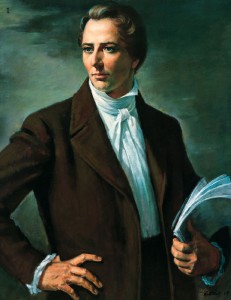| On June 28, 1844, after being shot by a mob, the bodies of Joseph and Hyrum Smith were placed in two separate wagons covered with branches to stop decay caused by the summer sun, and taken to Nauvoo by Willard Richards, Samuel Smith, and Artois Hamilton. The wagons left Carthage at 8:00 in the morning and arrived in Nauvoo around 3:00 in the afternoon. The members of the Mormon Church in Nauvoo were grief-stricken at the news of Joseph and Hyrum’s deaths, and thousands were there waiting for the arrival of the bodies.The next day Joseph and Hyrum’s bodies were laid at the Mansion House, which had been Joseph’s home. Thousands of mourners silently filed past the bodies throughout the day. By 5:00 p.m. the last of the mourners filed past the house. Joseph’s and Hyrum’s coffins were filled with sand, nailed shut and taken to the graveyard, where a public funeral was held, but their bodies were secretly buried in the basement of the Mansion House so that those who wanted to collect a reward for their deaths could not find their remains.At the public funeral, John Taylor wrote and read a stirring eulogy, which can now be found in the Doctrine and Covenants, section 135. Part of the eulogy said,
At the end of the eulogy, Taylor said Joseph “lived great, and he died great in the eyes of God and his people; and like most of the Lord’s anointed in ancient times, has sealed his mission and his works with his own blood; and so has his brother Hyrum. In life they were not divided, and in death they were not separated!”1 William W. Phelps a close friend of Joseph’s also spoke at the funeral and wrote the song, “Praise to the Man,” which is still sung by members of the Mormon Church. The lines of this hymn give great insight into the feelings of the saints at Joseph’s and Hyrum’s funeral.
Following the death of Joseph Smith there was some confusion as to who should lead the Church. Eventually Brigham Young, the senior Apostle, was sustained as the next prophet and president of the Mormon Church. On August 8, 1844, Brigham Young spoke to the members of the Church. At this meeting many reported that Brigham seemed to look and speak like Joseph, and this confirmed to them that it was God’s will that Brigham Young be the next leader of the Church. Other Links: 1 Section 35:3, 6. Doctrine and Covenants.
|

